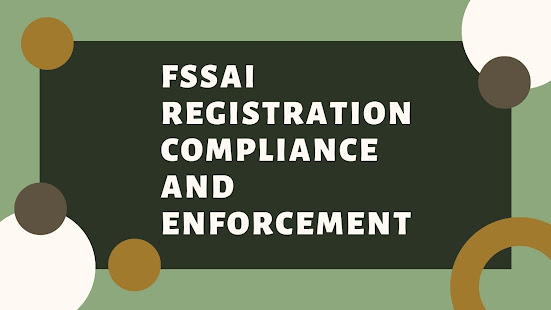FSSAI Registration: Compliance and Enforcement
The Food Safety and Standards
Authority of India (FSSAI) is the governing body responsible for regulating and
supervising food safety and quality in India. FSSAI registration is a mandatory
requirement for all food businesses operating within the country. Compliance
with FSSAI regulations and enforcement of the registration process plays a
crucial role in ensuring the safety and quality of food products available to
consumers.
FSSAI Registration Process:
The FSSAI registration
process involves various steps, including the submission of required documents,
payment of fees, and inspection of the premises. Food businesses must apply for
registration or obtain a license based on their scale of operations and
turnover. The registration process aims to bring food businesses under the purview
of FSSAI's regulatory framework.
Documentation and Record-Keeping:
To obtain FSSAI registration, food businesses need to maintain specific records and documents.
This includes details of the premises, food products, manufacturing processes,
and quality control measures. Accurate documentation and record-keeping enable
FSSAI to monitor and evaluate compliance with food safety standards.
Safety and Hygiene Standards:
FSSAI emphasizes the
importance of adhering to safety and hygiene standards in food establishments.
It sets guidelines for personal hygiene, cleanliness of premises, pest control,
waste management, and equipment maintenance. Compliance with these standards
ensures the production of safe and hygienic food products.
Labeling and Packaging Regulations:
FSSAI mandates clear and
accurate labeling of food products to provide consumers with essential
information about the product's ingredients, nutritional values, allergens, and
expiry dates. Compliance with labeling and packaging regulations helps
consumers make informed choices while ensuring transparency and preventing
misrepresentation.
Quality Control Measures:
FSSAI regulates the quality
of food products by setting standards for various parameters such as additives,
contaminants, microbiological limits, and pesticide residues. Food businesses
must implement quality control measures to ensure their products meet these
standards. Regular testing and analysis of food samples are conducted to
monitor compliance.
Inspection and Surveillance:
FSSAI carries out
inspections and surveillance activities to monitor compliance with food safety
regulations. Inspectors visit food establishments to assess hygiene practices,
documentation, labeling, and compliance with other requirements. Surveillance
activities include random sampling and testing of food products to detect any
violations.
Enforcement Actions:
In cases of non-compliance,
FSSAI has the authority to take enforcement actions. These actions may include
warnings, fines, suspension or cancellation of licenses, and legal prosecution.
Enforcement actions serve as a deterrent and encourage food businesses to
comply with FSSAI regulations.
Consumer Complaints and Redressal:
FSSAI provides a platform
for consumers to register complaints regarding food safety and quality issues.
It ensures timely redressal of complaints through investigation and appropriate
action against the concerned food business. This mechanism helps in maintaining
consumer trust and confidence in the food industry.

.png)


Comments
Post a Comment